Orangutans in Borneo
7 Days 2595 ex Bali

Accommodation
3 Nights Hotel
3 Night Klotok
Transportation
Mostly by boat.
Some walking & vehicle transfers

Included Meals
6 Breakfasts
3 Lunches
3 Dinners
Trip Grade
Category 2
Balanced Break
Charity
The Orangutan Project
The slim body of the wooden canoe glided across the glossy waters of Tanjung Puting National Park, the boat’s reflection glimmering in the sun. With just the shallow body of the boat separating me from the black, mysterious waters of the river, I dared not think of the creatures that swam below.
The captain of the boat navigated the mysterious waterways of the Sekonyer River, winding through tangles of trees and mangrove forests. We were completely enveloped by the rhythm of the Borneo jungle, where bird song and the call of primates echoed in the dense trees. My focus was single pointed as I intently watched for flashes of orange fur among the vibrant foliage, awaiting my first orangutan sighting.
Suddenly, a distinct rustling of branches caught my attention. High up in the green tangles of trees and leaves, I spotted a young orangutan, it’s fiery fur a stark contrast against the otherwise emerald hues of the rainforest. The primate sat among the trees, observing its surroundings, and attentively munching on bananas before shimmying down the tree trunk and disappearing into the thicket of the rainforest. As our boat continued to glide across the water, I spotted more and more orangutans. They playfully swung from twisted branches and scratched their bodies peering back at their curious observers.
Over the next four days, I was immersed into the heart of Tanjung Puting and explored the immense and magnificent habitats of one of the most ecologically diverse places in Borneo by boat and on foot. I fell into sync with the rhythm of the rainforest while learning about orangutan conservation and the preservation of their rapidly shrinking habitats. I met adopted orangutans at Camp Leakey—the oldest center for orphaned orangutans— and searched for the orange-furred primates among the trees and at feeding stations, an addition to help protect the endangered creatures.
“As I sit, my back leaning against a damp, moss-covered tree trunk, my eyes sweeping the canopy above, my ears straining to catch the crack of a distant branch that betrays an orangutan moving in the treetops, I think about how we humans search for God. The tropical rainforest is the most complex thing an ordinary human can experience on this planet. A walk in the rain forest is a walk into the mind of God.”
Birute Galdikas Great Ape Researcher and Conservationist
Called “Orang Hutan” by the indigenous peoples of Malaysia and Indonesia, the name of these remarkable primates literally translates to “People of the Forest.” One of the closest relatives to humans, orangutans share 97% of our DNA and are the largest arboreal primates yet face extinction. I experienced the daily routine of the Camp Leakey Foundation and their rehabilitation programs that improves the livelihood and future of one of the great apes, working with rescued orangutans and reintroducing captive orangutans back into the wild.
Each day, our long klotok—a traditional Indonesian riverboat and my home for the duration of my visit in Borneo— navigated us up and down the river, exploring the expanse of the park. My eyes were constantly on the watch for orangutans, a sighting that I never grew tired of.
Aboard the klotok, we explored the secrets of the rainforest, penetrating the worlds tucked deep into the trees. I learned about the flora and fauna that thrive in the forest, as well as the various obstacles that threaten their survival. Proboscis and macaque monkeys played on the trails and riverbank, while the armored bodies of false gavial crocodiles lurked in the water and on the river’s edge. I danced with the local Dayak tribe who thrive along the riverbanks and live in harmony with the forest, drawing upon the bounty of the jungle and using the medicinal powers of forest plants.
By night, I dug into dishes of freshly caught fish and counted stars in the pitch-black night sky. Aboard the klotok, I was lulled into a deep sleep by the gentle rocking of the boat, enveloped by the soothing sounds of nature and awaiting what the next day would bring.
A fully developed male orangutan can weigh up to 300 pounds while females are less than half that weight. Orangutan can live over 30 years and share 97% of their DNA with humans.

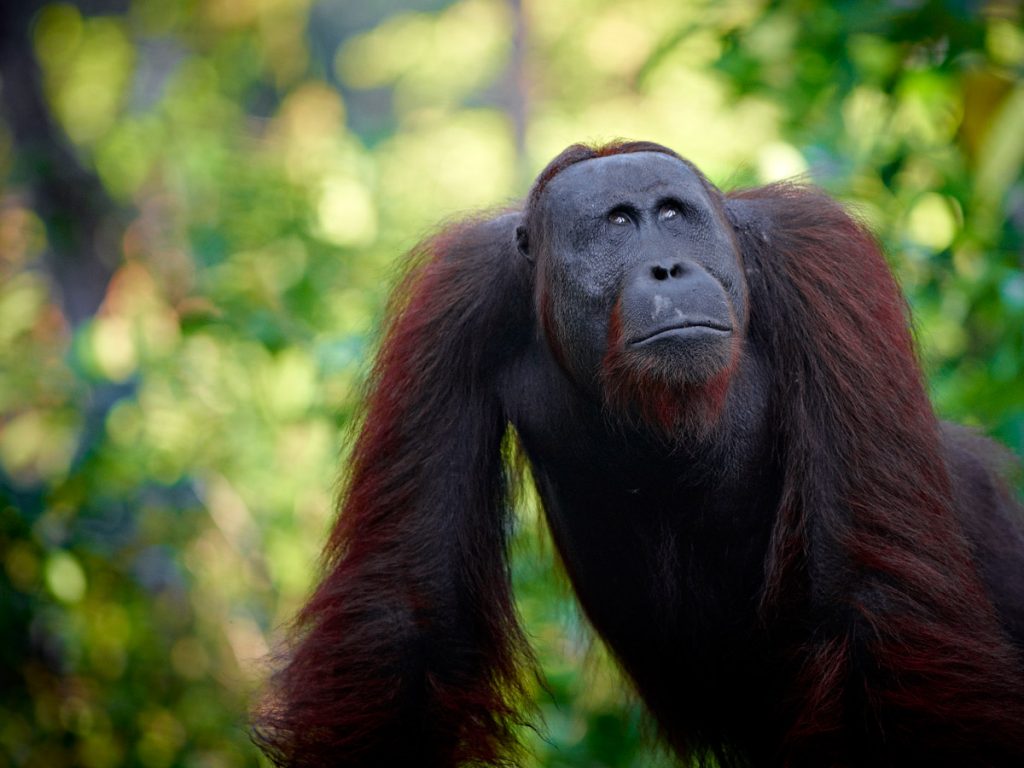
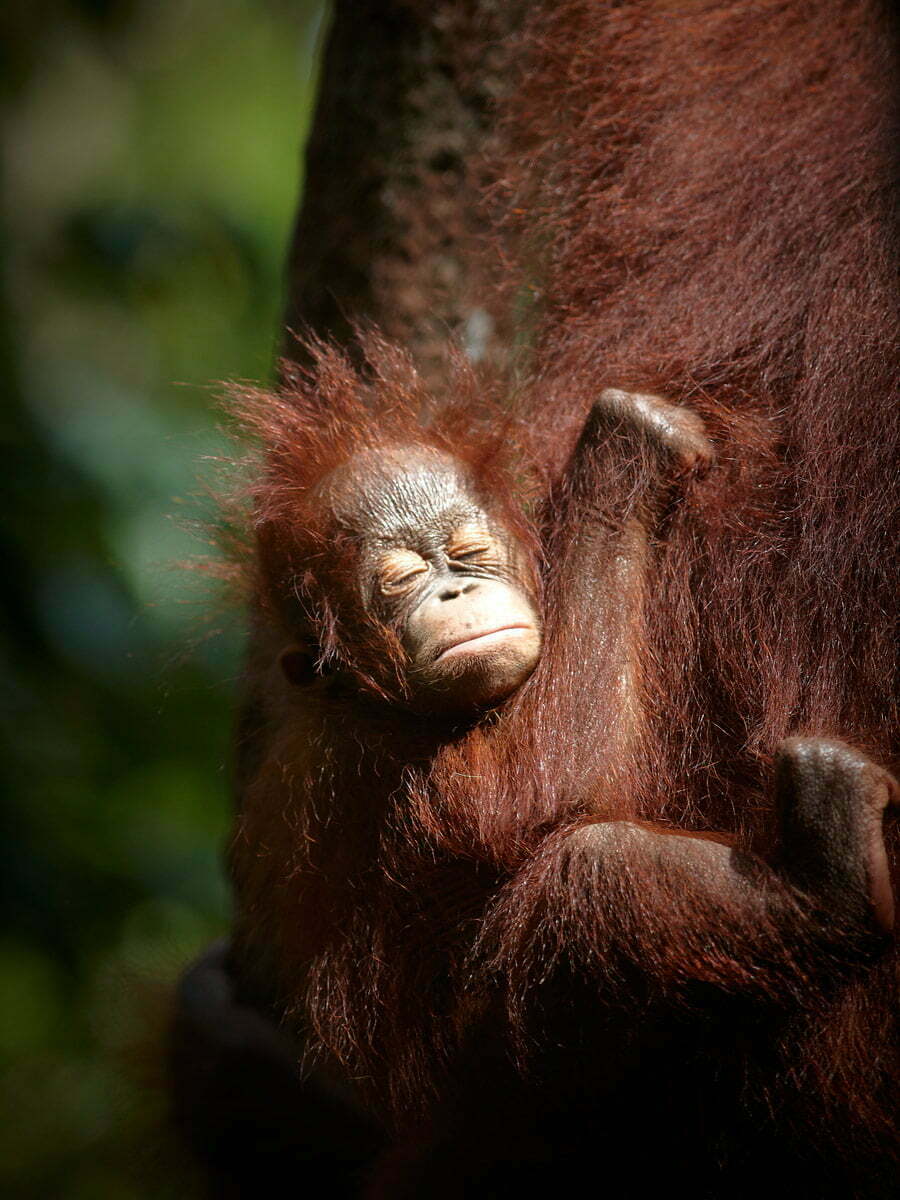
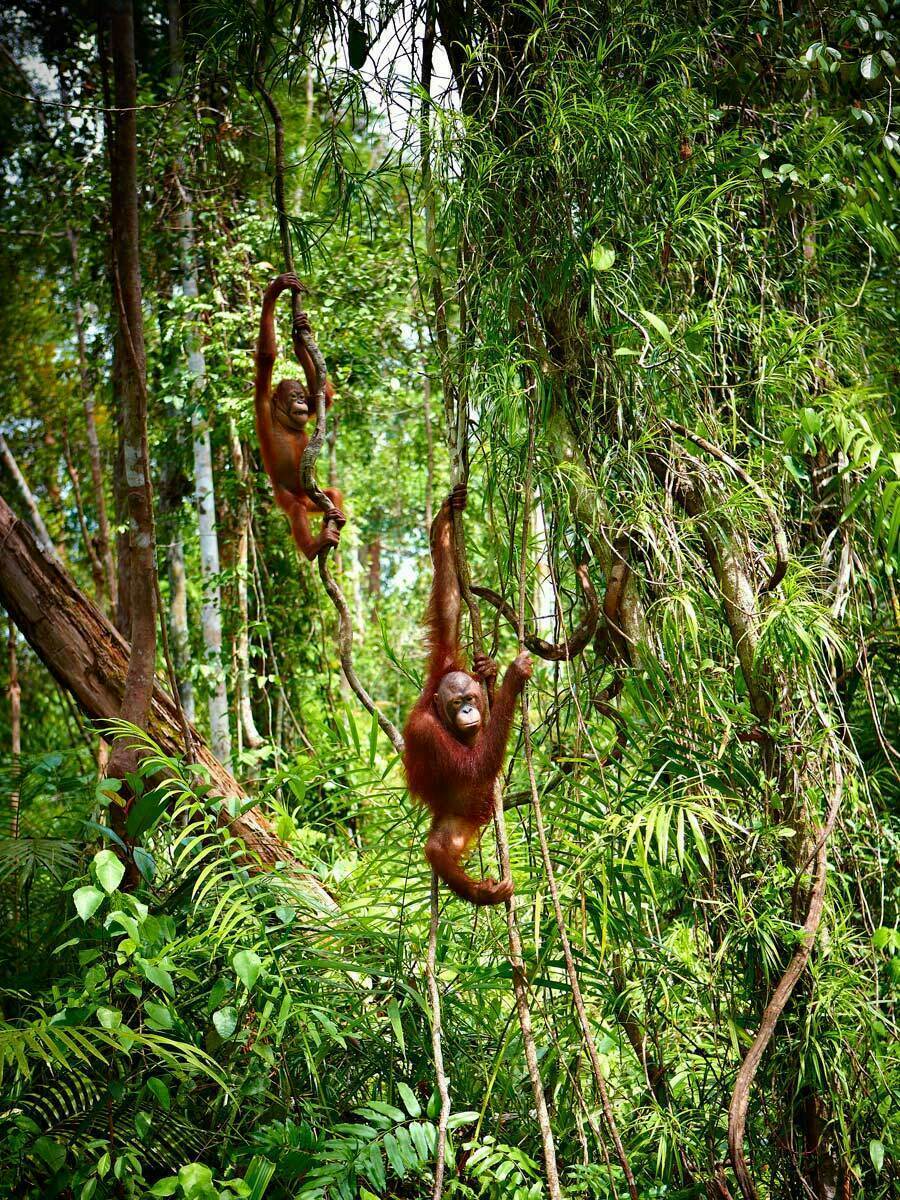
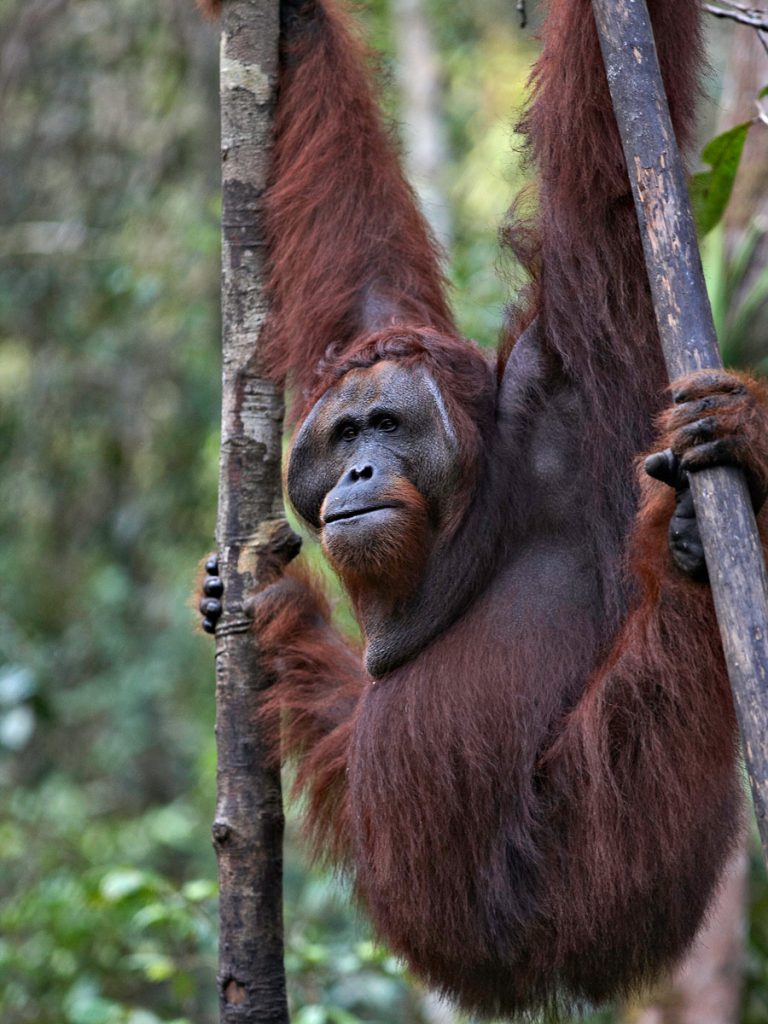
The Journey
Upon your arrival in Bali you will be met at the airport and transferred to your overnight accommodation. Overnight at Hotel.
Today you fly from Bali to Pangkalan Bun in Central Borneo via Surabaya. Arrival will be mid-afternoon (subject to flight schedule times). You will be met at the airport by your local OO guide and be taken to the hotel for check-in. Overnight at the Grand Kecubung Hotel. (B,L)
This morning, your journey begins as you head to the riverside town of Kumai, from where our riverboats, known as klotoks, will embark towards the National Park. Marking the commencement of your 3-day/2-night riverboat tour, you’ll gently navigate the river to spot orangutans and diverse wildlife. In the later part of the afternoon, your first stop will be at the Tanjung Harapan feeding station. As the day wanes, you’ll return to the river to look for proboscis monkeys. You’ll spend the night aboard your klotok, enveloped by the serene river ambience. (B,L,D)
Today kicks off with an early morning departure on the klotok, making your way up the Sekonyer River towards Camp Leakey, known for its sanctuary for orphaned orangutans. As you journey, keep your eyes peeled for a chance to spot wild orangutans, various bird species, monkeys, and other wildlife nestled in the riverside foliage. Upon reaching Camp Leakey, you’ll enjoy lunch on board before embarking on a brief walk to explore the area and visit the information center. It’s quite possible to encounter orangutans nearby or even have them observe you from a close distance. The afternoon will be spent observing the feeding of the orangutans and exploring the nearby forest. Following this, you’ll cruise down the river towards Crocodile Lake, where the evening will be spent. This leg of the journey offers opportunities to see Borneo’s other wildlife, such as gibbons and proboscis monkeys. The day concludes with another night spent aboard the klotok, complete with breakfast, lunch, and dinner provided.
After enjoying breakfast on the river this morning, you’ll set off for Pondok Tanggui, the second orangutan feeding station, to observe the orangutans. Post-lunch, embark on a village tour to experience the local culture. In the afternoon, your journey continues downstream, pausing to observe proboscis monkeys along the riverbanks. As evening approaches, the voyage heads back to Kumai harbour, where dinner will be served on the river, ideally under the enchanting glow of thousands of fireflies. The day concludes with a transfer to the Pangkalan Bun hotel, Grand Kecubung, where you will spend the night. Meals provided include breakfast, lunch, and dinner.
Today you will travel back to Bali and upon arrival, you will be met at the airport by your driver and transferred back to your Hotel for your final night’s stay of your expedition. If your travel plans require you to return home or to continue directly on to your next destination, you can make arrangements to end your expedition upon your arrival back in Bali. Overnight at Hotel. (B)
Your amazing adventure comes to an end and you are free to continue your travel plans or return home. (B)
Season
March to November
Includes
- 4 nights of hotel accommodation across Pangkalan Bun and Bali
- Domestic flights as noted in the itinerary
- 2 nights aboard a Klotok (boat)
- All Ranger, local guide & boat mooring fees
- National Park Fees
- All meals as indicated in itinerary (Breakfast – B, Lunch – L and Dinner – D)
Excludes
- International Flights
- Airport taxes
- Travel Insurance
- Tips
- Alcoholic beverages
- Any meals not listed as included
Your Guides and Safety
Our local team comes from the area in which we are travelling, Kumai and Pangkalan Bun. They know the area better than anyone and have a deep knowledge of the entire ec0-system of the Tanjung Puting National Park. They are also trained in first aid and understand the needs of our guests throughout the journey. They are great companions and we know they will ensure your stay in Kalimantan is a memorable one.
Accommodation
This trip will have 4 nights in very comfortable hotels and 2 nights aboard our very comfortable klotok (river boat).
In Bali we use a hotel near the airport so you are not wasting time negotiating Bali’s infamous traffic for too long. There we stay at the Holiday Inn. In Pankkalan Bun we use the Swiss Belinn Hotel, a very comfortable hotel will all the usual amenities you would find in a 3-star hotel.
For the nights in Tanjung Puting National Park, we will be staying aboard our klotok. The klotok has 1 cabin with an ensuite. There is a shower and toilet at the rear of the boat and the center deck becomes the bedroom of an evening. We make the boat as comfortable as we can, including foam mattresses and mosquito netting. The klotok has life vests, a lifeboat, fire extinguishers, and a first aid kit.
Orangutans are the largest arboreal (tree-dwelling) creatures on the planet. Each night, an orangutan will make a new bed for itself, by fulling branches and leaves together to form a platform on which to lay. Orangutans have been observed building shelters above their beds to keep the rain out.
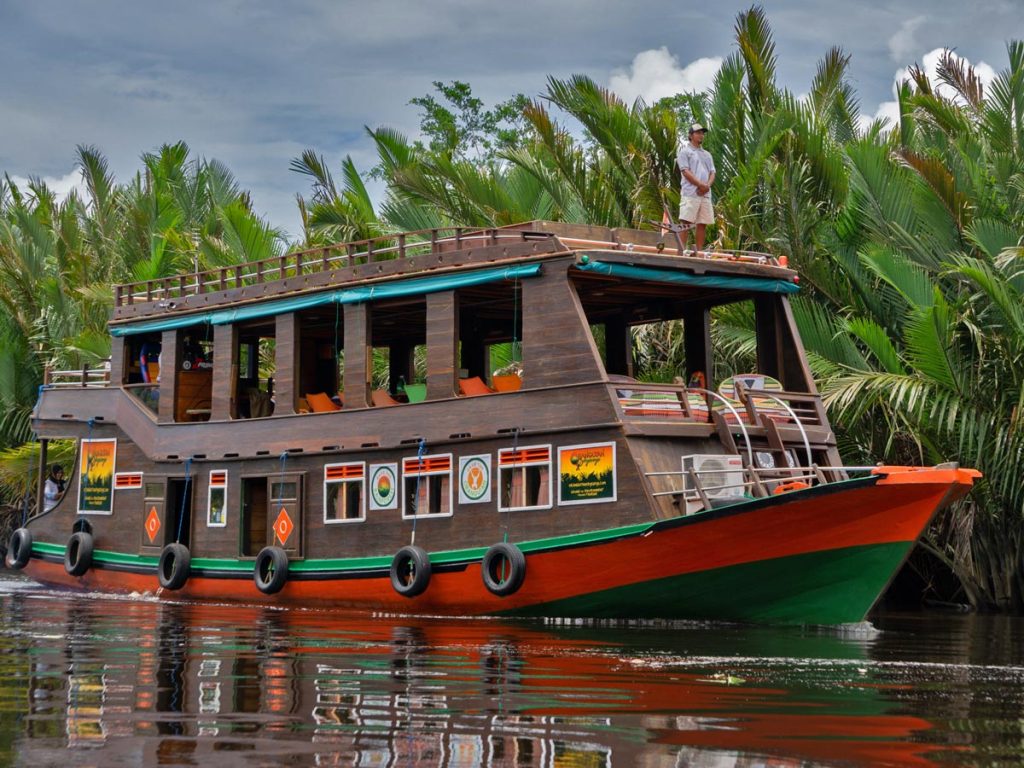

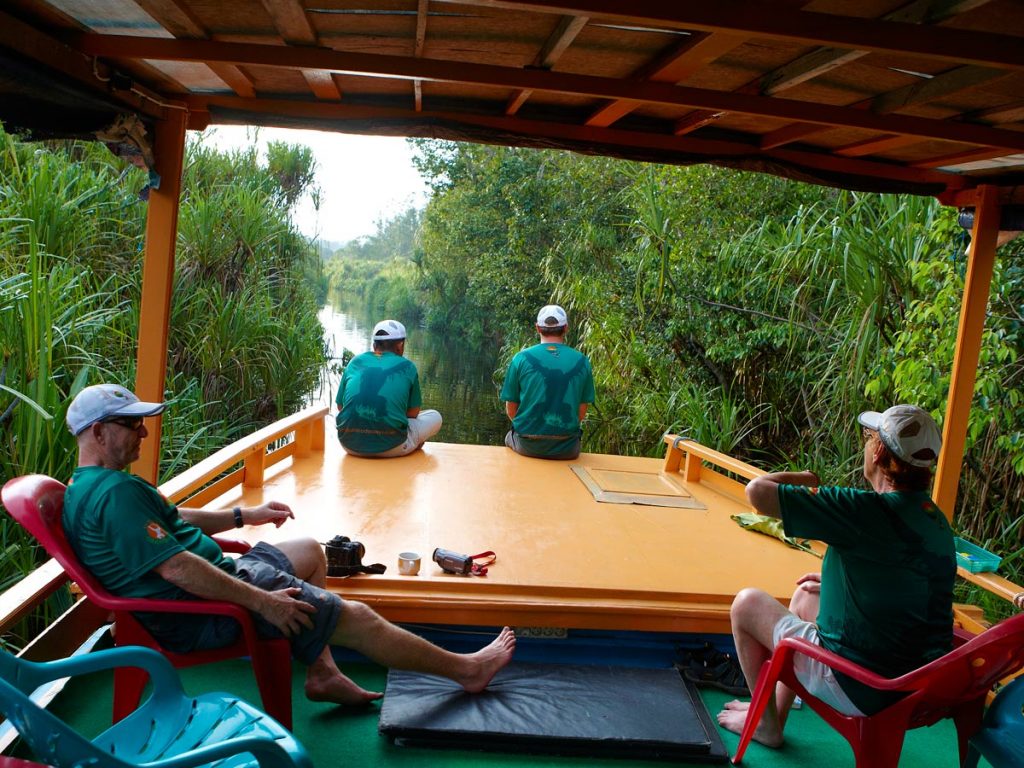
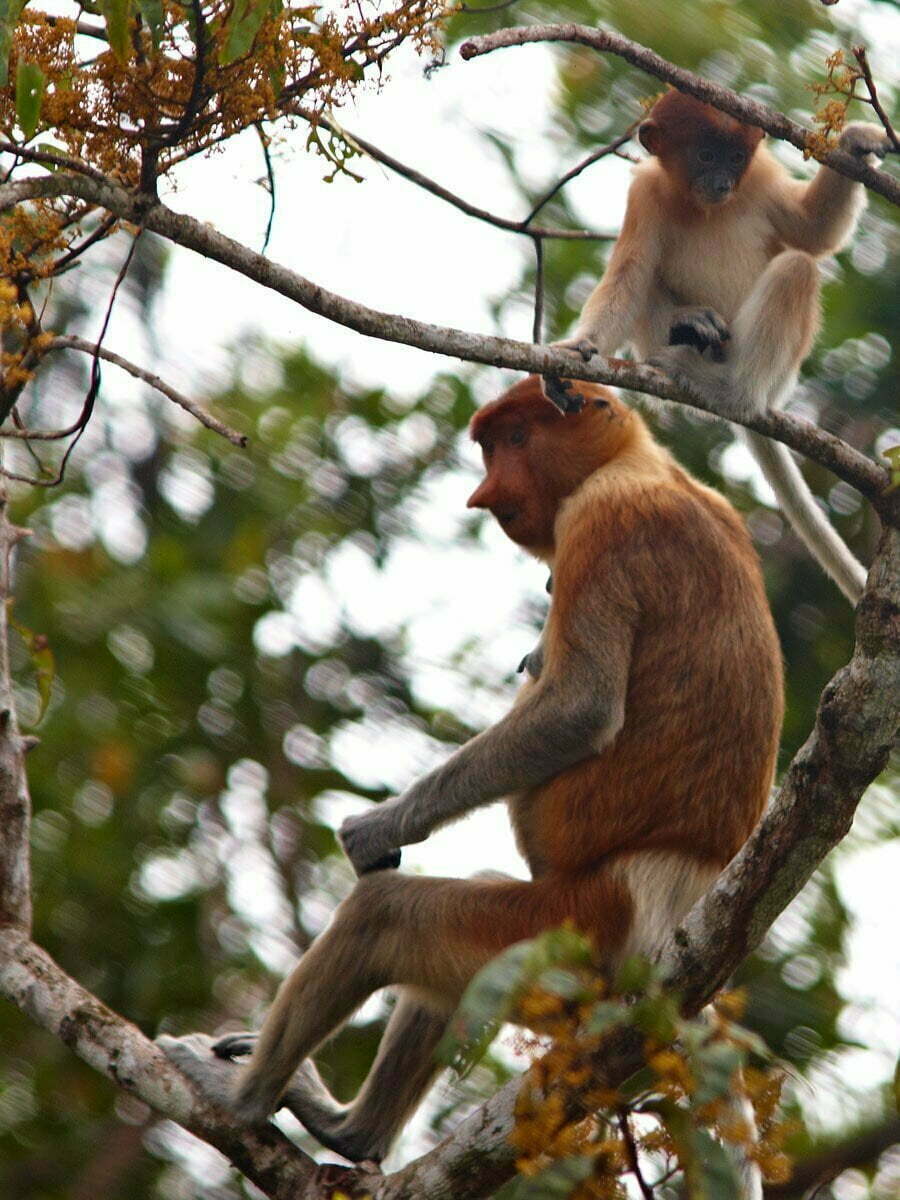
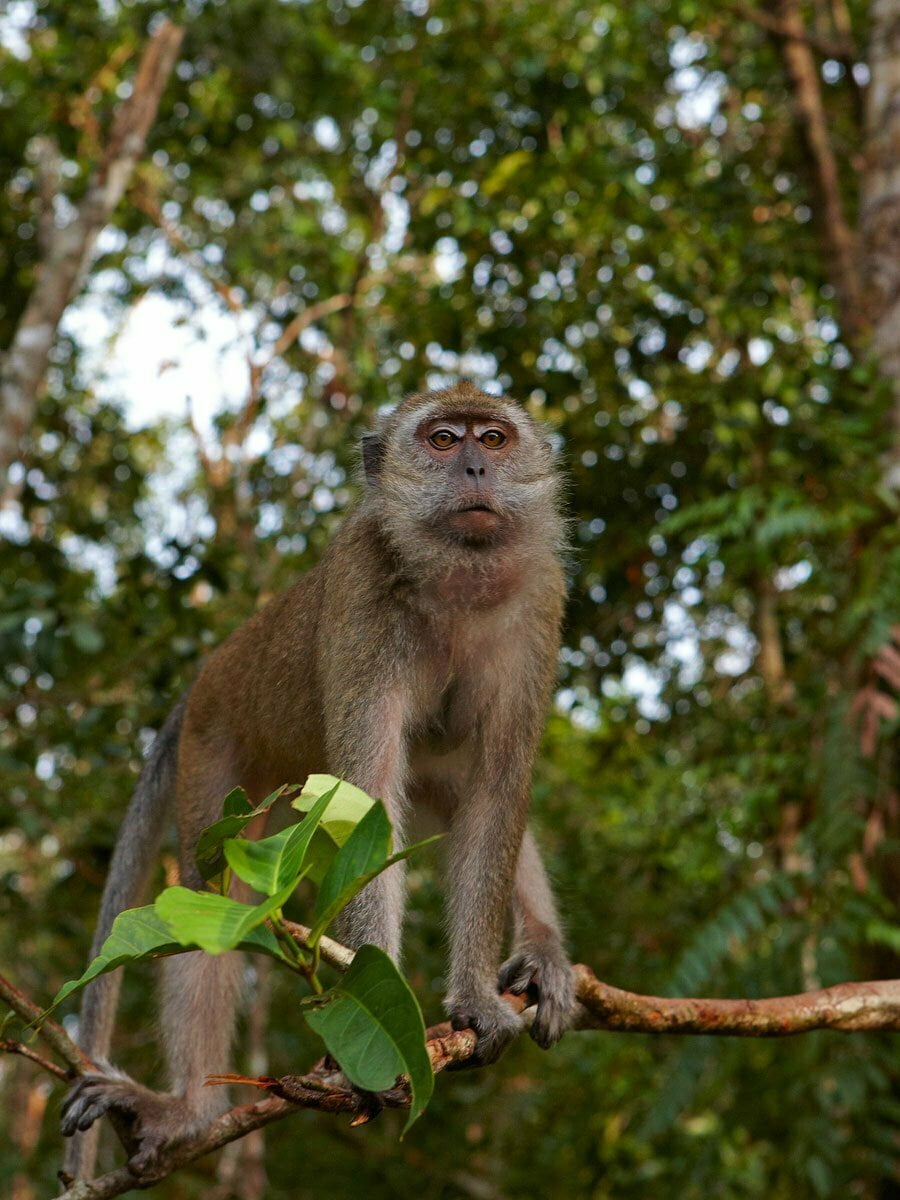
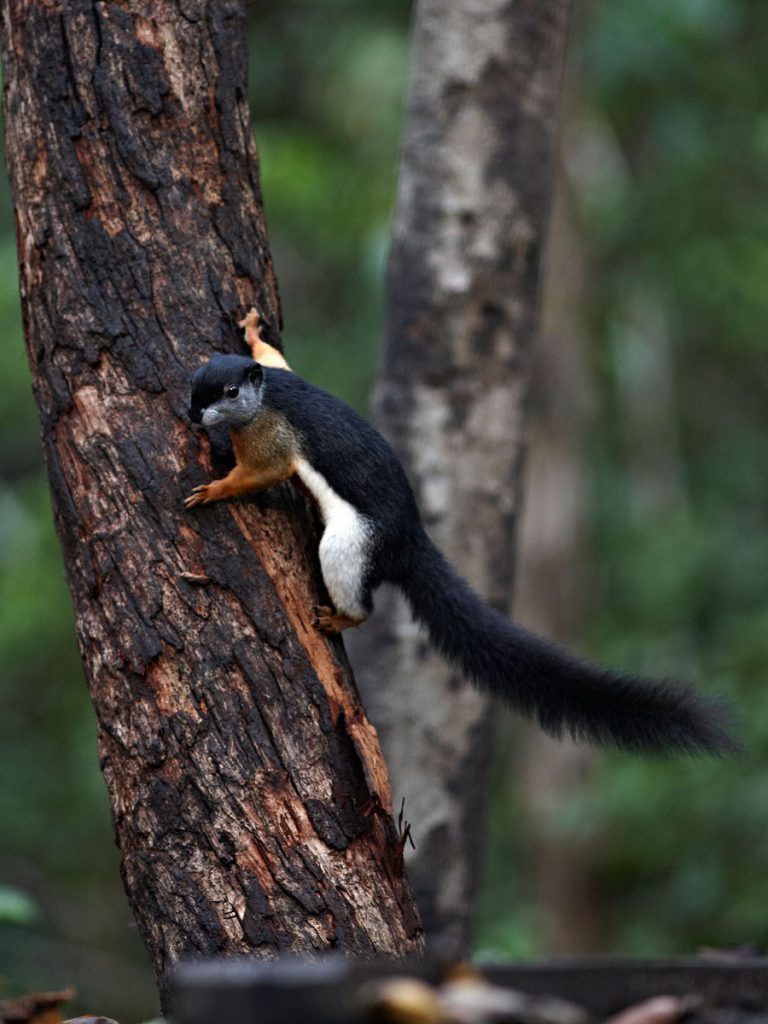
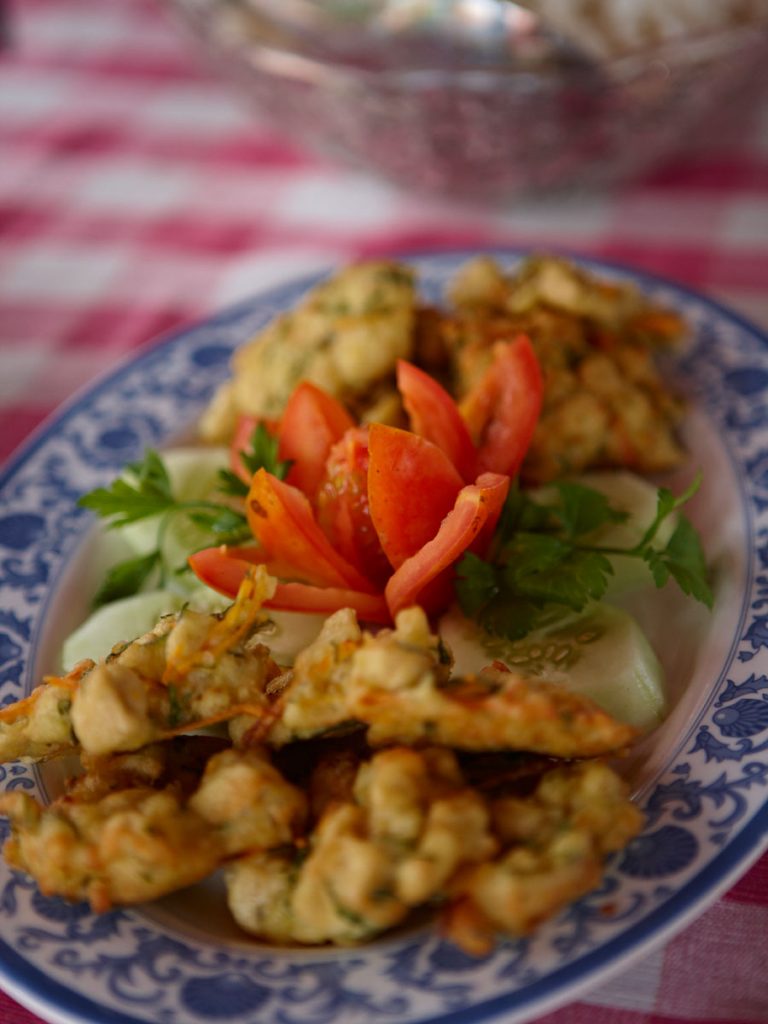
Food on the klotok
Onboard your klotok we will have a local cook, putting together some incredible Indonesian dishes, all freshly made there and then.
Dishes such as Nasi Goreng, Nasi Campur, Satays, Mie Goreng, Gado Gado and more. It really is delicious food.
If you have any particular dietary requirements please let us know and we can accommodate.


